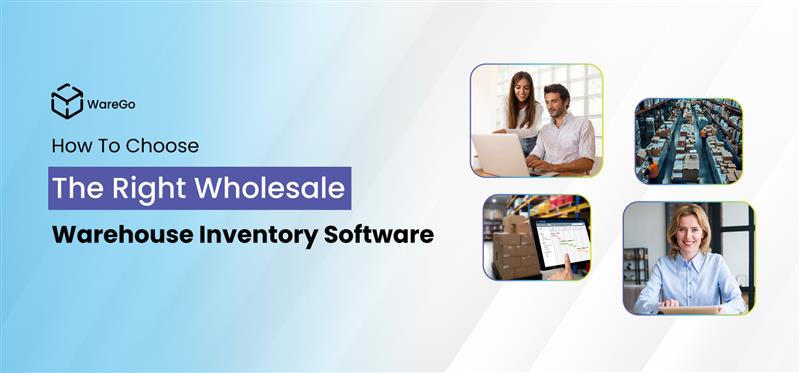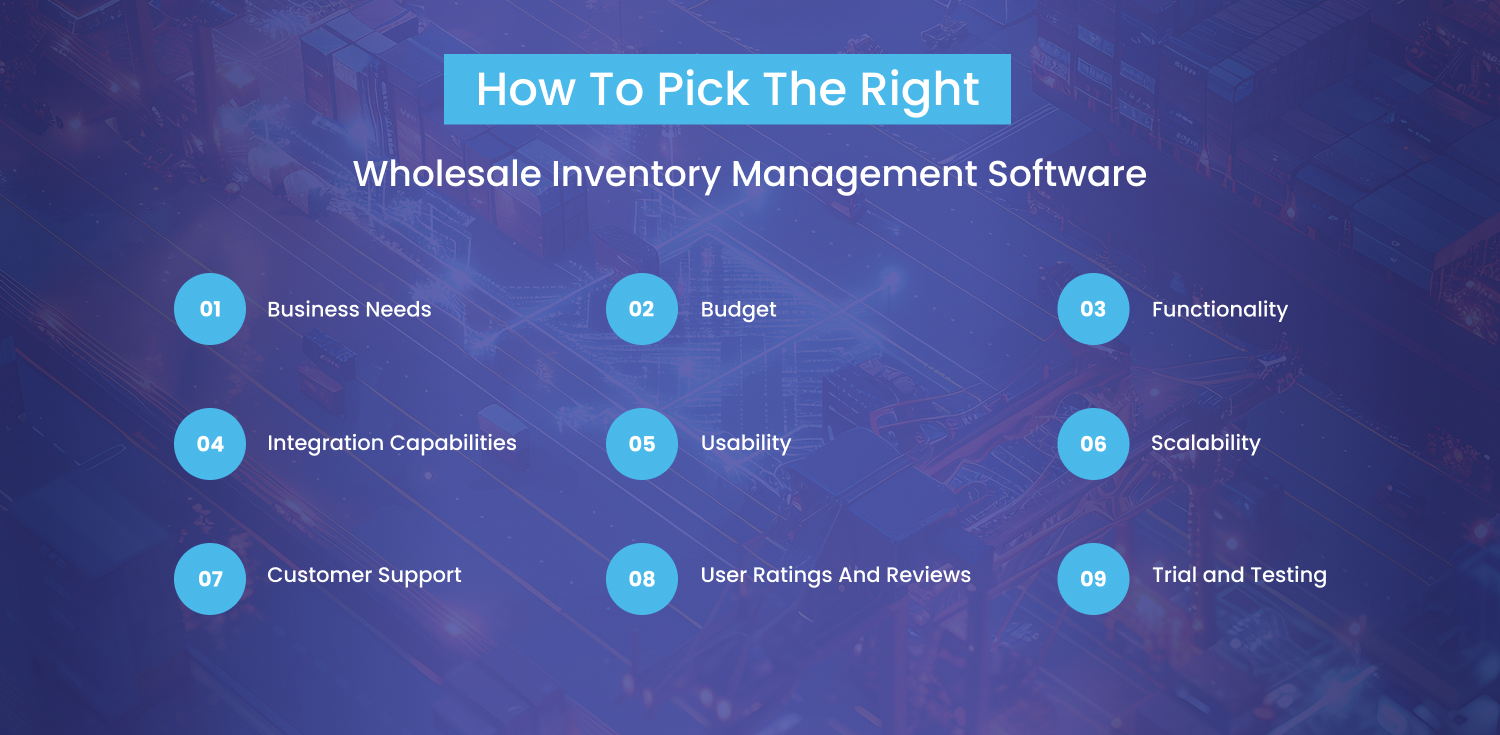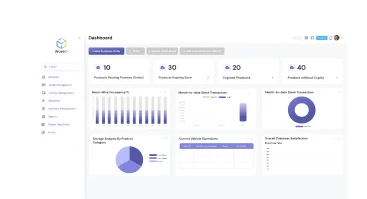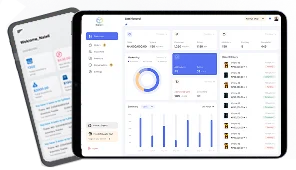
Unlike other industries, the wholesale business operates on a vast scale. Handling massive amounts of materials, keeping track of entire warehouses, and managing daily shipments to multiple clients are required to keep this $57 trillion business running smoothly. On this scale, even a minor error or miscalculation can result in a substantial loss.
With the exponential increase in population and quality of living, opportunities for a wide-scale wholesale business have significantly increased. This is where a wholesale inventory management software system is a great option that helps you manage a large scale of logistics data efficiently.
It allows you to manage your personnel, track your inventory, streamline workflows, and communicate with other departments using real-time data. These applications are specifically designed to make your business easy to manage, and increase overall efficiency and productivity.
In this blog, we’ll explore how to choose wholesale inventory solution. This will cover key features, compare essential functionalities, and highlight what to look for to ensure your operations stay efficient and accurate.
WareGo provides an automated, cloud-based, modern solution to all your wholesale inventory problems.
Start for freeTable of Contents
Step-by-Step: How to Choose Wholesale Inventory Management Software

Selecting the right inventory management software is a crucial step for any wholesale business. Due to large order volumes, multiple clients, and complex internal operations, having robust inventory management software is crucial to maintaining a smooth business operation. There are numerous inventory management software options available for wholesale companies, making the selection process feel overwhelming. The following is a step-by-step guide to find how to choose wholesale inventory solution:
Business Needs
Before selecting any inventory management system, first define your personal goals, requirements, and business needs. You must consider several factors before selecting software, including your business size, product variety, and number of locations. List the features that are required for your business, such as real-time tracking, barcode scanning, and order processing.
Once your requirements and needs are defined, draft a system that best fulfills these needs and explain how it will do so. Beforehand planning ensures that you go out into the market looking for what you want, rather than browsing in confusion.
Budget
Your dedicated budget has a significant impact on the number of options available to you. Inventory management software for wholesale varies widely in cost. Applications with fewer features will generally cost less than those with a rich feature list. It is a good idea to look beyond the base price.
Sometimes, even if a software looks inexpensive with virtually no downsides, it can still be more costly to set up and integrate. Set a realistic budget based on your needs and choose the software that fits both your needs and budget.
Funtionality
Different inventory management software provides various features. Pick the application that aligns with your business needs. For example, even if the management software provides real-time tracking of shipments, it would be useless if you already outsource your shipments and deliveries.
For wholesale businesses, features like barcode scanning, supply management, multi-location support, and bulk order processing are essential. Even if your budget allows it, avoid apps that are filled with unnecessary features; instead, go for the app that does what you want and does it reliably and efficiently.
Integration Capabilities
Even if an inventory management system is robust and efficient, if it cannot integrate well with your existing systems or those you plan to introduce in the future, then it’s useless. Your inventory management system should integrate seamlessly with other systems such as accounting, e-commerce, and shipping.
Without proper integration, a significant amount of manual work is required to communicate between different systems. Seamless integration is essential for wholesale businesses because doing manual work at that scale is virtually impossible. When selecting management software, ensure it can integrate seamlessly with your existing system.
Read More: How to Choose a Warehouse Management System Like a Pro in 2025
Usability
While having a functional interface is good, utilizing that functionality is a whole different story. The system’s usability directly affects how well your team can adopt it. For example, if your selected app suffers from poor UI/UX design, you might wanna consider changing your choice.
The inventory management software should have a flat learning curve and perform actions in minimal clicks. Features should be easy to use, and the user interface should be self-explanatory. If the software is complex and challenging to use, it leads to slow operations and increases potential mistakes.
Scalability
Having a scalable management app ensures that your inventory management system grows with your business. As your customer base increases, the volume of orders skyrockets, and your warehouses expand, the management software should be able to keep up without causing performance issues or requiring major updates.
Many modern inventory management software wholesale solutions, such as WareGo, offer a scalable model that can support an unlimited number of SKUs, warehouses, and users. Choosing a scalable software negates the need to switch systems later when your business grows.
Experience the power of smart inventory management with WareGo. Try it for free today!
Click hereCustomer Support
No matter how good the inventory management software is, problems with it are bound to arise somewhere along the path. For a business like wholesale, where wasting even a single second is costly, a reliable and quick customer support is essential. Whether it’s a bug in the code or a server error, their customer support should address the problem quickly to prevent significant losses.
Before getting an inventory management application, check their customer support first. Some software, like WareGo, even provides a free 30-minute video call meeting to guide you through any questions you might have.
User Ratings And Reviews
To get an idea of how the inventory management software will perform in the real world, check for reviews and ratings from previous users. Having a high rating and positive reviews generally means that the application is reliable, easy to integrate, and provides responsive support.
On the other hand, having a low rating and negative reviews should be considered a warning by former users. When reading reviews, look for comments that mention implementation and outcomes to get an idea about how the app is likely to perform.
Trial and Testing
Before purchasing software, consider using free trials to test the product and determine if it meets your requirements. Most major inventory management software providers, such as WareGo, offer a short trial period to allow users to test their product before committing to a purchase.
During this trial, ensure that you introduce the team to the software and gather their feedback. Testing also allows you to check how well the app integrates with your system and helps you decide if the software is worth the price.
Read More: How to Choose Third Party Logistics Software?
Role of Inventory Management Software in Wholesale Industry
The wholesale industry is one of the few sectors that track a vast number of items. In earlier times, each item was tracked manually and recorded in a ledger, resulting in an inefficient and error-prone process. Recent advancements in technology and app development have made it possible for development services to create an inventory management application that renders traditional methods obsolete.
Nowadays, inventory management software is the backbone of any wholesale business. With strong inventory management software, you can track any item entering or leaving your warehouse. Moreover, you can manage your items and equipment in real-time, mitigating the risk of losing or misplacing them.
Software for managing wholesale inventory streamlines workflows, reduces errors, and improves overall efficiency, according to Scitepress, while also providing seamless integration with existing and new systems. For wholesalers seeking to elevate their business, investing in inventory management software is a no-brainer.
Also Read: 10 Best Warehouse Management System Types (With Use Cases)
Get expert guidance with WareGo’s free consultation. Our team is here to help you at every step.
Get StartedTips to Find the Right Wholesale Management Software
Choosing the right wholesale software isn’t just about checking off a list of features, it’s about finding a system that truly fits your business, grows with you, and helps you stay ahead of the competition. According to Logistics Management, more than 65% of warehouse leaders say the right WMS helped them cut down on fulfillment mistakes and boost order accuracy.
If you’re not sure where to start, here are some practical, research-backed tips to help guide your decision:
- Start by identifying what your warehouse operation truly requires. Consider factors such as inventory volume, number of SKUs, multiple locations, and integration with sales channels.
- Choose software that provides live inventory updates to prevent stockouts and overstocking. Real-time data improves accuracy and decision-making.
- Make sure the WMS integrates smoothly with your existing systems, like ERP, e-commerce platforms, accounting tools, and shipping carriers.
- A clean, intuitive interface means less training time and faster onboarding. Your team should be able to navigate the system without frustration.
- Select software that can grow with your business, support more users, locations, and advanced features as you expand.
- Test drive the software before committing. Demos help you see if it fits your workflow and allows your team to give feedback.
- Don’t just go for the cheapest option. Look at what you’re getting for the price, automation, reporting, and long-term value matter more than upfront cost.
- See what other wholesale businesses are saying. Case studies and reviews can reveal real-world pros and cons.
- Go with a provider that offers strong customer support, onboarding assistance, and ongoing training resources.
Key Takeaways
Wholesale businesses operate on a massive scale, have numerous moving parts, and complex processes, rendering them impossible to manage manually. Modern inventory management systems optimize workflows and increase automation, making these behemoths easy to operate while also improving overall productivity.
Choosing the right wholesale inventory management system is a critical decision, which is why when selecting, look beyond the price and popularity. Pay heed to factors such as your business needs as well as the app’s functionality, usability, scalability, and customer support. Are you searching for a top-tier wholesale warehouse inventory management software? WareGo is an excellent platform for streamlining your inventory operations and gaining visibility across multiple warehouses. Partner with us now to make your mark!
FAQs
What is the best inventory management software for wholesale businesses?
There isn’t a single “best” inventory management software, as it all depends on your business size, complexity, and budget. WareGo provides a good balance between advanced features and an affordable price. It is a modern cloud-based application built with wholesale, 3PL, and warehouse operations in mind. Not only does it offer real-time inventory tracking, multi-warehouse support, and seamless integration, but it is also praised for its well-designed UI and state-of-the-art customer support.
What features should I look for in inventory software for wholesale businesses?
When selecting an inventory management software, look for an app that has fast performance, scalability, and ability to handle complex operations. Moreover, look for valuable features such as real-time tracking, cloud storage, and barcode scanning. The inventory management software should also integrate well with other systems, both new and existing. Having an application that supports large volumes of orders and multiple warehouses will ensure that you won’t need different software as your business expands.
How does inventory management software help wholesale businesses save money?
Inventory management software programs help wholesale businesses save money in several ways. Firstly, they minimize the risks of misplacing equipment, counting errors, overstocking, and supply shortages. Secondly, they provide crucial data, reports, and analytics to support data-driven decisions that help optimize cost spending. Inventory management software’s also automates manual and labor-intensive work, such as order processing and reordering, cutting labor costs.
Can wholesale inventory software integrate with my accounting or ERP system?
Yes, most modern wholesale inventory software, such as WareGo, can be easily integrated with accounting and ERP systems, enabling efficient data communication, including purchases and inventory levels, and reducing the risk of errors or miscommunication. This integration helps unify the workflow, enhance accuracy, and save valuable time.





